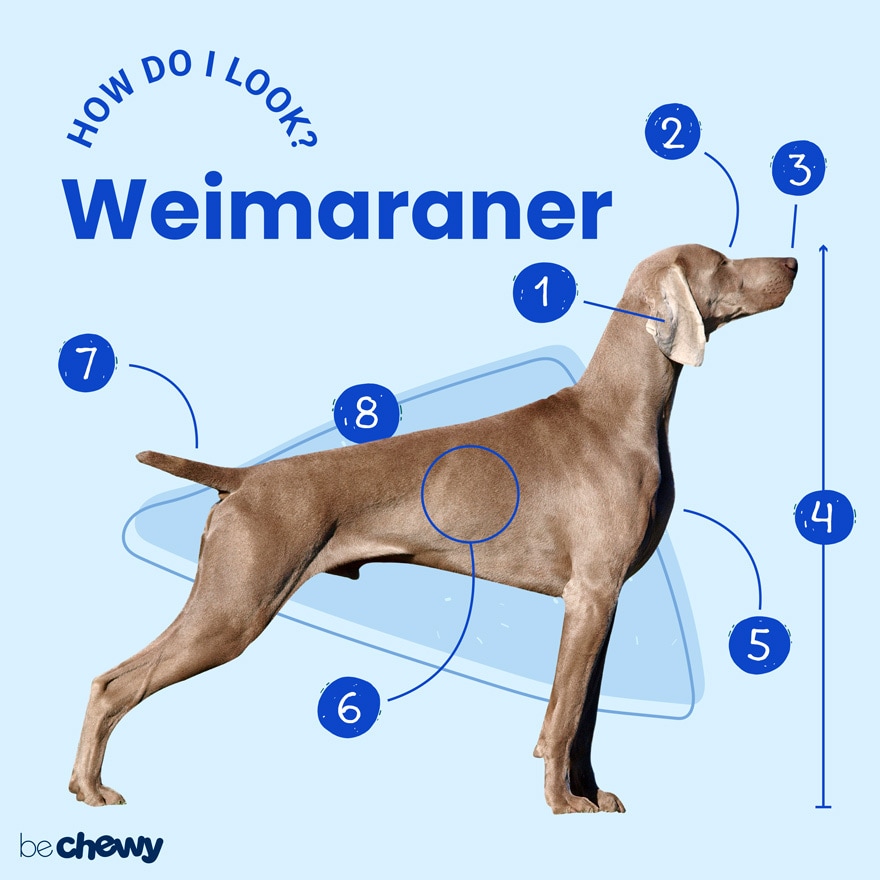The Weimaraner will stick by your side no matter what. And we mean it when we say no matter what: They’ll stick to you like glue all day, every day. This dog breed craves attention and is happy to join in on any activity, from couch cuddles to park play dates, as long as they are with their human. And with such a high-energy breed, you’ll want to make sure those activities include more outdoor adventures than not. These devoted family dogs eagerly keep up with active children and are fast learners, so don’t be surprised when they discover how to open the treat cupboard with a nose nudge. Your Weim may be a permanent toddler, but that’s OK—you’d take a busy life with this fun-loving dog over lazy days anyway.
Breed Snapshot
Temperament:
AthleticHappy HuntersIntelligentCoat Color:
BlueGraySilver Gray
Best For
Weimaraner dogs are graceful goofballs who are best for experienced pup parents and active families who live in a house with a big backyard where the pups can burn off all their energy. Weimaraners are great for one-human families, too—as long as you can keep up with their exercise needs.
Weimaraner Temperament
Weimaraner dogs are friendly and fearless. Their inquisitive personality can mean intently listening to your guidance when learning a new trick or running straight into a swarm of bees to see what all the buzzing is about. So, stay alert!
Spend one day with a Weimaraner, and you’ll quickly discover their love for human and animal connection. But thanks to their tall height, lanky stature and fast speed, they can be a bit clumsy around unstable toddlers, the elderly and small pets. So make sure you keep an eye on your Weim when grandma comes for a visit.
Weimaraners will experience separation anxiety when you’re gone too long. Expect some judgy side-eye and a disheveled bed when greeting your Weimaraner at the door if you’ve been away for the day.
A Weimaraner loves to use their mouth during playtime, whether engaging in a game of tug-of-war with their pet parent or nibbling a plush toy. If an unexpected bite happens, it’s most likely from misjudging where your hand will go next, and the dog will often pause to apologize for the mistake.
This social breed loves to be out and about, from visits to friends’ homes to public outdoor spaces. And they adapt quickly and find joy in poking their noses in whatever activity you’re doing. Do you have a farm? Weimaraners love investigating other animals and might point at waterfowl, such as ducks and swans, thanks to their natural hunting capabilities. (So, make sure your birds are out of reach.)
How to Care for a Weimaraner
If you’ve got treats, you’ve got an obedient Weimaraner. This breed thrives on food and the thought of getting food; so when it comes to working on leash training (they like to pull!), teaching a puppy to sit still for brushing or asking the dog to leave yard bunnies alone, having a pocket of yummy treats, like these bite-sized ones from Blue Buffalo, will muster their full attention. Fortunately for you, your Weim doesn’t need a lot of grooming, so you can spend all that time training and playing with your pup.
Weimaraner Health
Weimaraners have a lifespan of 10-13 years, and, like any dog, they have a few health issues. It’s important to be aware of these health problems so you can help your pup live as healthy a life as possible.
- Foreign Object Ingestion: One of the most common reasons Weimaraners land in the vet’s office is for eating something that’s not food. The best way to manage this situation is prevention. Keep small children’s toys, dirty laundry and other curiosities off the floor where the dog can get to them. If the dog does eat a foreign object, please take them to your vet immediately. In some cases, the vet can induce vomiting to recover the object. In other cases, the vet may use X-rays and/or an ultrasound to help determine if surgery to remove the object is needed.
- Hip or Elbow Dysplasia: Dysplasia occurs when the joints do not form properly and therefore do not fit together well. This can cause pain, lameness and arthritis. Treatment options will often include pain medication, weight management, joint supplements and, in severe cases, surgery.
- Bloat or Gastric Dilatation-Volvulus (GDV): This acute emergency occurs when the dog’s stomach rotates and becomes twisted in the abdomen. Symptoms typically include retching or dry heaving, distended abdomen and restlessness, which may present as pacing. Time is critical. If you think you may have a pet experiencing bloat, they need to be seen at the emergency vet right away. Emergency surgery is typically needed to correct the situation and save the pet’s life.
- Entropion: This genetic eye condition occurs when the eyelids roll inward such that the eyelashes rub on the cornea of the eye itself. This can cause redness, pain and corneal ulcers. Surgery may be needed in severe cases.
- Hypothyroidism: This endocrine disease occurs when the thyroid gland does not produce enough thyroid hormone resulting in weight gain, hair loss and lethargy. Diagnosis is typically via blood test and treatment is with daily medication.
Weimaraner History
The origin of Weimaraners takes us to early 19th century Germany. The Grand Duke of Weimar (the breed’s namesake city) expressed the desire for a dog who was bold, fearless, intelligent and an excellent hunting companion with a strong prey drive. The sportsman had several breeds crossed (possibly Bloodhound with German and French hunting dogs) to create the Weimaraner breed.
Historically, Weimaraners were bred for sport and to minimize predator problems. These dogs use their acute senses to detect and point at their prey, leading their human hunting companion in the right direction. In Europe, the hunting dogs were used to flush out wolves, bears and mountain lions that were harming livestock. Big game hunters also prized the breed for their skills.
The dog started showing up in America in the 1920s, and the American Kennel Club (AKC) recognized Weimaraners in 1943. Weimeraner fans include President Eisenhower and Grace Kelly.
Are you ready to add a Weimaraner puppy to your family? A list of reputable breeders is available on the AKC website. What’s the price for a Weimaraner puppy? Expect to spend between $500-$3,000 for a puppy who’s been screened for health and temperament issues and may come with pedigree papers. You can also check out Weimaraner rescues or your local animal shelter. You can also search Chewy’s database of adoptable dogs in your area.
FAQs
Are Weimaraners hypoallergenic?
No, Weimaraners are not hypoallergenic. Even though they have a short coat, they shed both hair and dander, which can trigger allergies. Regular brushing and bathing can help reduce allergy responses among humans in the Weimaraner’s household.
Are Weimaraners smart?
Yes, Weimaraners are very smart dogs—if you understand how to motivate them. They crave mental stimulation and appreciate having jobs or tricks to do for you. Challenge them. They love it!
Are Weimaraners good family dogs?
Yes! Weimaraners are good family dogs. They thrive with active families (just watch them around small children—they may knock them over). This dog breed is loyal, obedient and inquisitive, making them an involved family member during their lifetime. Weimaraners are excellent travel companions and would love to join their family on driving vacations and weekend outdoor adventures.
How do you pronounce “Weimaraner”?
You can pronounce Weimaraner two ways:
- The British pronunciation is the closest to the original German and is pronounced vai-muh-raa-nuh.
- In the United States, we say wy-mah-rah-ner.
For short, Weimaraners are often called Weims, Gray Ghosts or Velcro dogs (for their clingy, loving demeanor).
Why do Weimaraners nook?
Nooking is a trait unique to Weimaraners. Nooking is when a Weim gently sucks on a toy or blanket to soothe themselves, much like a child with a pacifier. So, let them nook. It calms separation anxiety and keeps them happy. Plus, it looks adorable and makes lovely Instagram-worthy snapshots.
What are the most common Weimaraner mixes?
The most common breed mixes are:
- Weimaraner-Great Dane mix (Great Weimar)
- Weimaraner-German Shepherd mix (Weimshepherd )
- Weimaraner-Husky mix (Weimarsky)
- Weimaraner-Labrador Retriever mix (Labmaraner)
Note: These are not purebred dogs but mixed breeds.

Top Takeaways
Weimaraners are smart, loving dogs who do well in active households with kids and babies as well as other dogs. Life with a Weim is best enjoyed with frequent outdoor adventures, weekly brushing to keep shedding to a minimum and lots of one-on-one attention to keep their busy minds content.
Expert input provided by veterinarian Dr. Jerry Klein, the American Kennel Club‘s chief veterinary officer; and certified dog trainer and puppy development expert Ali Smith, owner of Rebarkable.
Breed characteristic ratings provided by veterinarian Dr. Sarah J. Wooten, DVM, CVJ, a veterinarian at Sheep Draw Veterinary Hospital in Greeley, Colorado; dog trainer and behavior consultant Irith Bloom, CPDT-KSA, CBCC-KA, CDBC, owner of The Sophisticated Dog, LLC, in Los Angeles; and certified animal behavior consultant Amy Shojai, CABC, in Sherman, Texas.
The health content was medically reviewed by Chewy vets.

Search for Adoptable Weimaraners Near You
Female Names
- Luna
- Bella
- Willow
- Piper
- Gracie
- Stella
- Daisy
- Lucy
- Lola
- Skye
Male Names
- Duke
- Blue
- Gunner
- Finn
- Cooper
- Zeus
- Blu
- Moose
- Ruger
- Loki
Share:





















